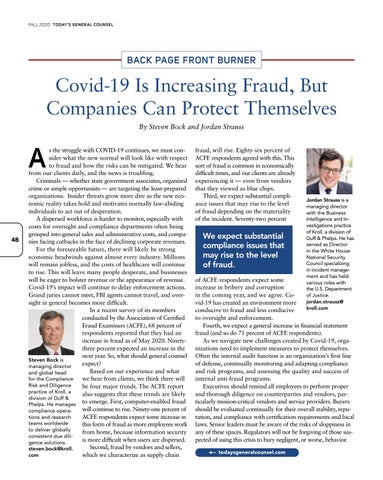FALL 202 0 TODAY’S GENER AL COUNSEL
BACK PAGE FRONT BURNER
Covid-19 Is Increasing Fraud, But Companies Can Protect Themselves By Steven Bock and Jordan Strauss
A 48
s the struggle with COVID-19 continues, we must consider what the new normal will look like with respect to fraud and how the risks can be mitigated. We hear from our clients daily, and the news is troubling. Criminals — whether state government associates, organized crime or simple opportunists — are targeting the least-prepared organizations. Insider threats grow more dire as the new economic reality takes hold and motivates normally law-abiding individuals to act out of desperation. A dispersed workforce is harder to monitor, especially with costs for oversight and compliance departments often being grouped into general sales and administrative costs, and companies facing cutbacks in the face of declining corporate revenues. For the foreseeable future, there will likely be strong economic headwinds against almost every industry. Millions will remain jobless, and the costs of healthcare will continue to rise. This will leave many people desperate, and businesses will be eager to bolster revenue or the appearance of revenue. Covid-19’s impact will continue to delay enforcement actions. Grand juries cannot meet, FBI agents cannot travel, and oversight in general becomes more difficult. In a recent survey of its members conducted by the Association of Certified Fraud Examiners (ACFE), 68 percent of respondents reported that they had an increase in fraud as of May 2020. Ninetythree percent expected an increase in the next year. So, what should general counsel Steven Bock is expect? managing director Based on our experience and what and global head for the Compliance we hear from clients, we think there will Risk and Diligence be four major trends. The ACFE report practice of Kroll, a also suggests that these trends are likely division of Duff & Phelps. He manages to emerge. First, computer-enabled fraud will continue to rise. Ninety-one percent of compliance operations and research ACFE respondents expect some increase in teams worldwide this form of fraud as more employees work to deliver globally from home, because information security consistent due diliis more difficult when users are dispersed. gence solutions. Second, fraud by vendors and sellers, steven.bock@kroll. com which we characterize as supply chain
fraud, will rise. Eighty-six percent of ACFE respondents agreed with this. This sort of fraud is common in economically difficult times, and our clients are already experiencing it — even from vendors that they viewed as blue chips. Third, we expect substantial compliance issues that may rise to the level of fraud depending on the materiality of the incident. Seventy-two percent
We expect substantial compliance issues that may rise to the level of fraud.
Jordan Strauss is a managing director with the Business Intelligence and Investigations practice of Kroll, a division of Duff & Phelps. He has served as Director in the White House National Security Council specializing in incident management and has held various roles with the U.S. Department of Justice. jordan.strauss@ kroll.com
of ACFE respondents expect some increase in bribery and corruption in the coming year, and we agree. Covid-19 has created an environment more conducive to fraud and less conducive to oversight and enforcement. Fourth, we expect a general increase in financial statement fraud (and so do 71 percent of ACFE respondents). As we navigate new challenges created by Covid-19, organizations need to implement measures to protect themselves. Often the internal audit function is an organization’s first line of defense, continually monitoring and adapting compliance and risk programs, and assessing the quality and success of internal anti-fraud programs. Executives should remind all employees to perform proper and thorough diligence on counterparties and vendors, particularly mission-critical vendors and service providers. Buyers should be evaluated continually for their overall stability, reputation, and compliance with certification requirements and local laws. Senior leaders must be aware of the risks of sloppiness in any of these spaces. Regulators will not be forgiving of those suspected of using this crisis to bury negligent, or worse, behavior. todaysgeneralcounsel.com
